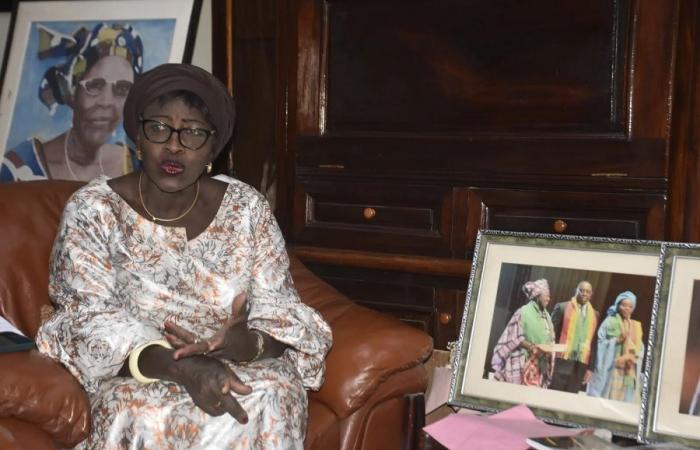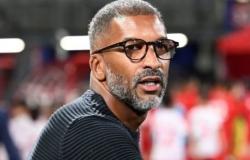
She was certainly not born in Senegal, but she is one of the professors and women of letters who have left, and who continue to leave, their mark in Senegalese and African literature, and in the fight for mastery of the French language. in French-speaking Africa.
Professor André Marie Diagne, born André Marie Bonané, is not just a simple follower of Letters. The native of Bobo-Dioulasso in Upper Volta (now Burkina Faso) lives and brings literature to life within her family and wherever she is, thanks to her passion, her activism and her legendary intellectual generosity.
She is one of the Senegalese and African academics who continue to promote the French language through literature and Books. Professor André Marie Diagne, born André Marie Bonané, stands out in the world of Letters thanks to his love, his activism and his incredible sense of the quest and sharing of knowledge, as well as innovation. Born in Bobo-Dioulasso, in Upper Volta (now Burkina Faso), in the middle of the 20th century, Professor André Marie Diagne started school under trees, like many African children, during the colonial era. The daughter of a teacher, notably a school principal, it didn't take long for her to catch the teaching bug. Introduced to reading and supervised by her mother from a very young age, she will begin to read everything she has in her hands.
“We had a mother who taught us how to do everything at home. There was no servant. We knew how to clean, cook, do laundry. We did everything. When I was told that it was my turn to clean, in each room I passed through, if there was a book: stopover, reading. So, I couldn’t finish it,” she confides, all smiles. A smile which, according to her husband, retired philosophy professor Mamossé Diagne, never leaves her. Thus, by spending time with books, the former head of the Department of Modern Letters at the École normale supérieure (ENS) from 1983 to 1988 was able to develop within herself a deep love for literary works, both African and foreign. Out of pure curiosity and natural inclination, she reads and discovers new adventures, countries and horizons. And this passion for reading, Ms. Diagne also instilled in one of her daughters, with whom she began reading at the age of two, using the “i” of the national daily “Le Soleil”, which was red, and the rest was black.
“We learned to read thanks to the Sun. My children began their love of reading and books early. I took them to the French Cultural Center at the time to borrow books. At home, there were always books, gifts, comics. What I liked when I arrived in Senegal around the 70s and 80s was that at the Tilène market, there were a lot of comic book sellers. The children said: “damay ndieund livre adventure” (I want to buy an adventure book),” she says wistfully.
From Bordeaux to Dakar
In fact, if Professor André Marie landed in Senegal, beyond his destiny, it is thanks to the magic of love. She set foot on Senegalese soil after her marriage to the philosopher Mamossé Diagne whom she met in France, where she was pursuing university studies. After her primary education, she was sent to the Sisters from 6th to 12th grade, in Ouagadougou, where she obtained her literary baccalaureate in A4 series. “When I passed the literary baccalaureate, the Sisters told me that I had to go to Fontenay-aux-Roses. I didn't really know what it was. These were preparatory classes. I was taken to France to do preparatory classes. I landed in Bordeaux, and that's where I met Mr. Diagne. I was supposed to come here, but I was diverted from the itinerary. We did the preparatory classes together,” she says, always smiling.
Having obtained Senegalese nationality under the President of the Republic Léopold Sédar Senghor, she was scheduled to teach at the Mathurin Diop Middle School (CEM). “The lady didn't want a French teacher, and Professor Iba Der Thiam, who was at the time director of the École Normale Supérieure (ENS), said to bring me to ENS so that I could do my educational training and integrate into Senegalese society. This is how I became one of the first teachers of the ENS reform in 1975,” explains the General Inspector of National Education. She specifies that she went to France to study philosophy and returned as a literature professor. Her Certificate of Aptitude for Secondary Education (CAES), obtained in 1976 at the École Normale, president of the National French Commission of Senegal, responsible for the development, evaluation and reform of programs , is assigned to Van Vo high school (current Lamine Guèye high school). She taught there before leaving for a teaching internship in Brussels, Belgium, where she studied didactics to obtain a trainer training diploma.
“Unlike the university where we train graduates, we train future teachers. So, I believe that the love of teaching I caught since my childhood. I gave vacation lessons to my little brothers and sisters, my neighbors, etc. This is what continued in me. Instead of being a lawyer, as one of my uncles said, I love teaching. I like to share knowledge,” confides the founding member and honorary president of the Senegalese Association of French Teachers (ASPF).
Legendary intellectual generosity
Sharing knowledge: Professor André Marie Diagne makes it a priesthood. Today, retired, she continues to visit schools with one of her former colleagues. With their books, they make students read and write. It's a new project to try to revive the love of reading and education among young people. And if this education inspector goes to such lengths to arouse a love of literature in the new generation, it is because she thinks that we should not be withdrawn into ourselves. As sociologist Émile Durkheim argued, “education plays the role of socializing institution par excellence, it makes the child a social being.” This social being, Ms. Diagne really is, if we rely on the testimonies of one of her former students, Professor Massamba Gueye. According to him, Professor André Marie Diagne is a “very generous person who likes to share knowledge”. “She is very available, and it is with her that we found a love of reading and literature,” testifies the man of letters.
Concerning his commitment to literature, our interlocutor maintains that Professor André Marie Diagne “does not like literature, it is literature. She lives through literature. She embodies it.” And for the new generation, Professor Massamba Gueye believes that she is “a model to follow”, particularly for her love and her perpetual quest for knowledge.
This spirit of openness, Professor André Marie also gets it from his father, who was for his students, a dad, a counselor, a nurse. “He did everything. We came to him when there were sick people. So that put me in this open situation. I owe it to my parents to have this attitude of openness towards people and respect for people. It’s important,” says Ms. Diagne, who is also a member of the Board of Directors and project manager to the President of the International Federation of French Teachers (FIPF) for girls’ education and women’s training in Africa. (REPROF-EFFA).
“André Marie gave everything to our country, to his family, to his colleagues. Until now, she is involved in many things, in “the 10 words of the French language”, and as soon as we talk about the French language or culture, we think of André Marie. We owe a lot to this woman. André Marie is a bridge between Senegal, Burkina Faso and the rest of Africa. It symbolizes the intellectual Pan-Africanism that has always existed in this country. She is often forgotten in Senegal, and her husband repays her,” adds Professor Penda Mbow.
A loving and caring wife
If the retired associate professor of philosophy, Mamossé Diagne, praises his wife whenever the opportunity allows him, it is because he considers that he was lucky to have “ the best of wives.” “I don't just owe it to subjective thinking, but it's the pure truth. Since I met her, almost 50 years ago, I don't remember having had anything from her other than her dazzling smile, her bursts of laughter. I went to look for her for this reason, far from our borders,” rejoices Mr. Diagne, found in his library, surrounded by books. Books which symbolize the link between the two beings, who met in France, on the platform of the Saint-Jean station in Bordeaux. Since the beginning of their romance, Ms. Diagne has been “the happiest of men”. Because, he specifies: “My wife is special in that she seems to be made of kindness. She gave me everything. If I got to where I am today, it is largely thanks to her, both intellectually and emotionally. »
For his part, Professor Penda Mbow finds that between André Marie and Mamossé, there is a “fused, very committed” couple in everything relating to Letters, teaching, society and intellectual life. According to the historian, Professor André Marie “perfectly” complements her husband. “Marie André is very modest, and I believe that this is a character trait of the Burkinabé man. We don't see Mamossé without him talking about André Marie, without valuing his wife. And that's what we always expect from a man. Intellectual couples can only survive when there is mutual admiration. This is what makes an intellectual couple strong. André Marie and Mamossé are the example of a fusional couple, formed in love, but also from knowledge, knowledge, well-being and aesthetics,” insists Professor Penda Mbow .
The life of Professor André Marie is also his time in the Senegalese media, notably to host literary programs. She collaborated with Sada Kane on her show “Regard”. Before that, she co-hosted a show with Abdoulaye Sada Sy on RTS, where they invited schools to talk about the works on the program. She also accompanied Sada Kane on 2S TV with her show “Impression”.
Her biggest dream today, in retirement, would be to find herself in a small island like Gorée, with a pleasant climate like that of Saint-Louis, a quiet house where she could read, write and produce, with the man she she chose in her life, her partner Professor Mamossé Diagne, her grandchildren and the possibility of participating in broadcasts and visiting schools to have students read.





